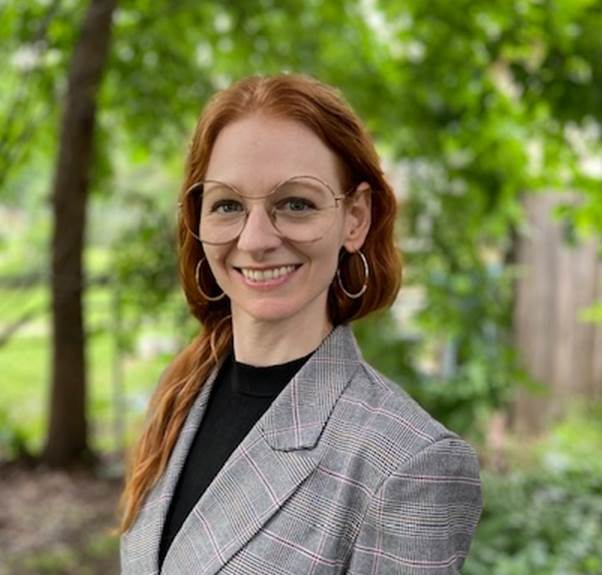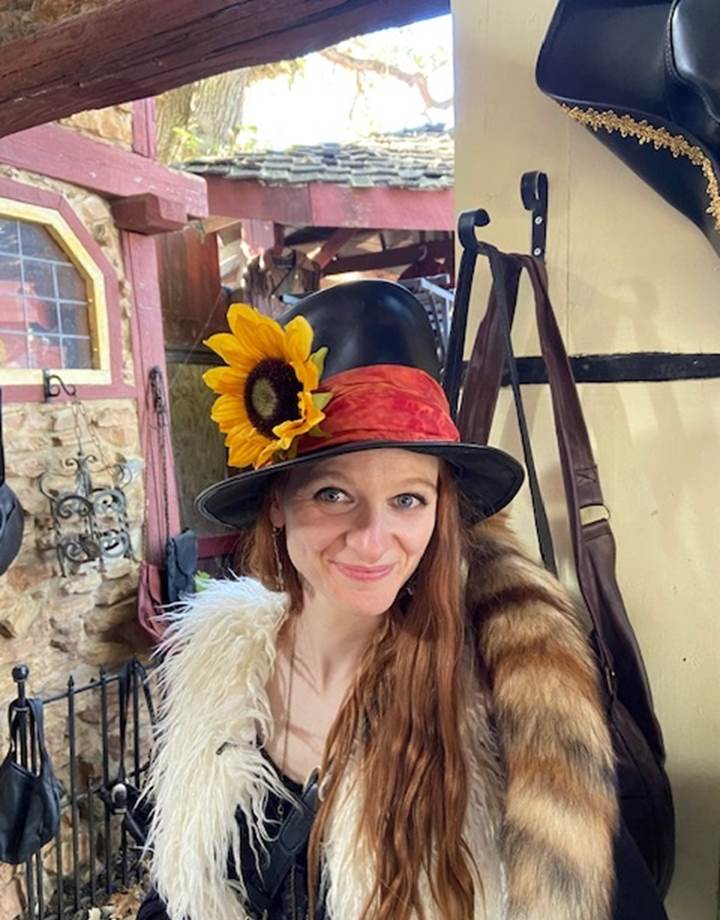Elizabeth Steyer was born into a white Midwestern hearing family. Her father's job took the family from Kansas City to the Twin Cities when she was a toddler. “As a tiny child, I apparently had powerful lungs and my family joked that I’ll one day be an opera singer. The joke’s on them when my family discovered I was deaf.” This led to ASL becoming her first language. Throughout Elizabeth’s childhood, she attended various schools in different settings. Initially, she was surrounded by deaf peers at mainstream settings in Harley Hopkins and Como Elementary. Then, from first grade, Elizabeth was fully immersed in the Deaf world at Metro Deaf School. Starting her freshman year at a mainstream high school, she was the only deaf student. “Many people asked me if my Deaf identity had diminished during my high school years. The answer is quite the opposite: being in the hearing world illuminated my Deaf identity and pushed me to embrace my Deaf journey.”
“I believe that having a strong, nourishing foundation in Deaf culture guided me through my experiences in the hearing world. By the time I graduated, I returned to the Deaf world by enrolling at Gallaudet University to pursue degrees in International Relations and French, with a minor in Spanish. My dream back then was to have a career at the United Nations.”
Instead, Elizabeth entered the field of linguistics after serving in AmeriCorps in New Mexico. During her service, Elizabeth worked closely with families of deaf children, many among them native Navajo and Spanish speakers. “They profoundly influenced my perspective on language acquisition, cultural identities, communication styles, and human connections.” Elizabeth ended up going to graduate school and pursued linguistics. The highlight of her brief career as a language researcher was conducting fieldwork in Haiti. “It’s a pivotal moment that reminded me that the world’s governments are woefully educated when it comes to crafting policies that directly impact the lives of disabled people and people with disabilities.” This prompted Elizabeth to explore other career opportunities.
After several career changes that involved grant project management and accessibility consultancy, Elizabeth joined a Deaf start-up as a product researcher and discovered UX design. Once again, she went back to school and earned a professional diploma in UX design, along with a foundational certificate in web accessibility. “And here I am, with many more plans yet to achieve my career aspirations!”
In 2025, Elizabeth achieved her dream of becoming a UI/UX Designer and now works as the in-house designer at the Communication Service for the Deaf. “Looking back, the professional choices I’ve made along the way have proven to be stepping stones. Crafting the career you desire requires both strategy and foresight. For those seeking to break into this highly competitive field, here's the advice: take it one step at a time. Build the experience and skills necessary to reach that door. And when the time is right, that door will open—ready for you to walk through.”
Prior to her current position with CSD, Elizabeth worked as a Product Solution Analyst in the Product Experience and Operations Unit within the Digital Services, Analytics, and Insights Division at the Office of Inspector General. Her team, the Product Experience Team (PET) was quite new, having been formed in November 2023, the same month she joined. Their main responsibility was to ensure that their users' journey through their products reaches its ultimate destination: providing all the required information to the Office of Inspector General so certificates and licenses can be issued from the State. “With great power comes great responsibility - our products are very new, and we serve thousands of users across the state. Many of these users have spent years doing paperwork for licenses and certificates, which are now processed through our digital products: Agency Hub and Provider Hub.”
“I'm a passionate learner, and this work teaches me something new every day—sometimes every hour!” Elizabeth is most inspired by successfully resolving barriers for users, enabling them to complete their tasks. She particularly enjoys tackling difficult problems, especially those that require multiple perspectives and additional research to reach a clear solution.
Communication is a significant challenge at work. “We operate in an agile environment, requiring rapid communication, ongoing collaboration, and constant iteration. I initially jumped into this workplace without an interpreter due to the unpredictable nature of the workflow.” Eventually, through advocacy for better accessibility, they hired a permanent staff interpreter to streamline communication channels. Every morning she attends scrums, including mini-scrums with her interpreter team, which consists of both a staff interpreter and a freelance interpreter. “During these sessions, we prepare communication I want to convey and identify the specific information I’m seeking.”
Elizabeth’s approach to working around these challenges involves seeking out resources and support that are barrier-free and building her understanding of her work from there. “My thinking is that challenges, whether old or new, will always exist. It’s important to position myself where I can effectively marshal and utilize resources to address and refine these challenges to my benefit. It’s also valuable to seek out support. In my case, the Office of Accessibility and Equity is my go-to contact for addressing workplace accessibility issues.”
“Perspective is everything. Everyone works differently, and every workplace is different so it’s tough to offer targeted advice beyond maintaining a bird’s eye view, patience, and self-care.”
Elizabeth shares the following advice: “It's very, very common for a deaf person to interact with a hearing person, but it's very, very rare for a hearing person to interact with a deaf person. Considering this, I'd advise patience as exposure takes time and hearing people must be constantly educated. I strongly believe that deaf people are naturally agile and extraordinarily adaptable because we grow up in the hearing world and have a great wealth of experiences and hard-earned lessons that can serve as assets in any environment. However, hearing people often have misconceptions, and it does take time, sometimes a lot of time, to gradually dissolve these misconceptions along with systemic flaws through actions, self-advocacy, and patience. Because of this, holding a bird’s eye view of the whole system helps maintain balance between tenacity and self-care. We’re leading full, rich lives as deaf people in the hearing world, making unprecedented advances that are transforming the world, and we deserve self-care and compassion as we push boundaries against others’ comfort for the sake of accessibility. Changing the world is a tough calling that many of us must answer to continue paving the path for future generations of disabled people. We’re absolutely entitled to look after our wellbeing, enjoy Deaf space whenever we can, and take it easy.”
Whenever she has the time, Elizabeth pursues her #1 passion: Wandering. She loves dropping herself somewhere completely unfamiliar, embarking on adventures, and meeting locals along the way. She has traveled to 45 countries, surfed couches across Eastern Europe, hitchhiked across Australia, gotten lost in Myanmar, followed Deaf guides in Cambodia and Morocco, and she’s currently planning a trip to Japan and South Korea for the Deaflympics 2025. When Elizabeth is chilling at home, she considers herself a jill of all trades.” I craft storytelling in both ASL and English, capture portraits of animals and their human pets, and practice yoga. This year, I'm turning my hands toward pottery and gardening. I'm also a foodie and love experimenting with drinks. One of my dream hobbies is to brew delicious beverages from herbs grown in my garden. Of course, that means cultivating a garden, studying herbalism, and finding the time to do it all!”
In parting, Elizabeth shares the following insight: “Networking and open dialogue are invaluable tools in life, both personal and professional. To effectively network and master the delicate art of open dialogue, start by understanding the overall organization and structure of your surroundings and gently approaching individuals who possess the resources and information you seek. Remember, these individuals are also human—their experiences shape their understanding of people, resources, and information. Cultivating a connection with them can help them better understand you and offer the specific guidance you seek. Similarly, you have resources and information that others might seek for, so keep your lines of communication open and well-polished!”
The #CanDoAnything campaign showcases people who are deaf, deafblind, or hard of hearing at work, giving them an opportunity to share what they do at their jobs and explain how communication access works for them. This campaign shows what our community can do, which is anything!

